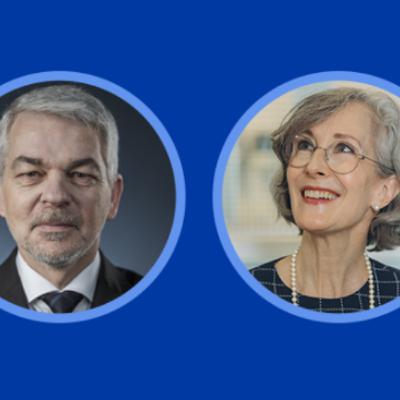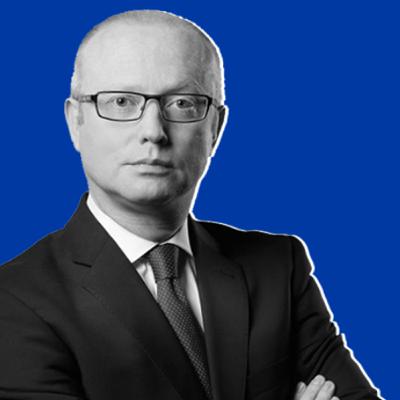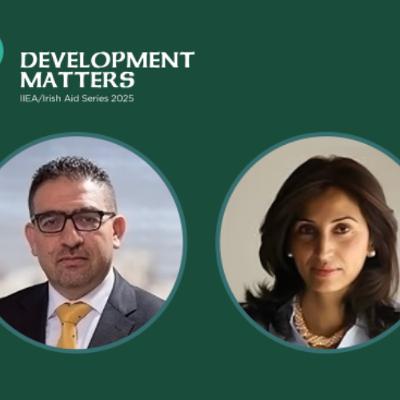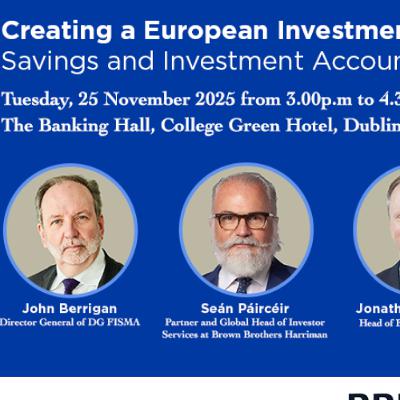Discover IIEA Talks
IIEA Talks

666 Episodes
Reverse
Cybersecurity has become a defining challenge for Ireland and Europe, with digital ecosystems underpinning our economic prosperity, democratic resilience, and the functioning of critical infrastructure. As energy systems, healthcare, financial services, and other systems become more digitally interconnected, the potential societal impacts of cyberattacks grow exponentially. In this panel discussion, organised in conjunction with Accenture, this event discusses the risks which Ireland and Europe face from a heightened risk environment, and how Europe can augment its resilience to a more complex cyber threat landscape.
The panel for this event include:
- Jacky Fox, Senior Managing Director, Global Lead for Security Strategy Practice, Accenture
- Richard Browne, Director of the National Cyber Security Centre
- Donal Óg McCarthy, Cybersecurity Lead, Ireland, Accenture
- Joyce Hakmeh, Associate Fellow, International Security Programme, Chatham House
This IIEA event features a keynote address by Cristina Gherasimov, Deputy Prime Minister for European Integration of the Republic of Moldova and Chief Negotiator with the EU, outlining Moldova’s progress towards EU membership, key reform priorities, and the challenges shaping the accession process. Deputy Prime Minister Gherasimov’s address be followed by a discussion with leading academic and policy experts examining Moldova’s advancement in the EU accession process, the broader evolution of EU enlargement, and the strategic context for Europe. This discussion also explores the role of EU Member States, including Ireland, in supporting Moldova’s path towards EU membership.
This event is part of the IIEA’s Future-proofing Europe Project, which is kindly supported by Department of Foreign Affairs and Trade.
About the Speaker:
Cristina Gherasimov was appointed Deputy Prime-Minister for European Integration and Chief Negotiator with the European Union in January 2024 and reappointed in the Alexandru Munteanu Cabinet, formed after the parliamentary elections, held in September 2025. She previously served as Adviser to the President of the Republic of Moldova on Foreign Policy and European Integration, as well as holding the position of Secretary General of the Presidential Office. In these roles, Cristina Gherasimov served as the President's Sherpa for several European and global summits and events, such as the European Political Community Summit, UNGA, and Moldova Support Platform, among others. Her responsibilities extended to coordinating efforts in the area of foreign policy and EU integration process. For a short period after, Cristina Gherasimov also served as Secretary of State at the Ministry for Foreign Affairs and European Integration. Prior to her service in the Moldovan government, Ms Gherasimov acquired a rich and diverse background in academia, research institutes, think tanks, and public organisations.
In this event, Kent Walker, President of Global Affairs for Google, discusses the importance of Ireland as a digital economy hub in Europe and the role of the digital economy in ensuring Ireland’s future prosperity.
Mr Walker also discusses how Ireland can harness its upcoming presidency of the Council of the EU, starting in July 2026, to push for the measures that are needed to unleash Europe’s digital competitiveness and to secure Europe’s digital resilience.
In his remarks, Mr Walker examines the debate about Europe’s regulatory framework, the growing role of AI, and how to ensure Europe’s resilience against digital threats.
This event is organised as a collaboration between the IIEA and Google.
Kent Walker is President of Global Affairs at Google and Alphabet, overseeing content policy, government and regulatory affairs, and legal, risk, and compliance matters. With a 30+ year career at the intersection of technology, law, and policy, he has led Google's advocacy on key issues and served as the first chair of the Global Internet Forum to Combat Terrorism. A Harvard and Stanford Law graduate, Kent was previously an Assistant U.S. Attorney and held executive positions at Netscape, AOL, and eBay. He serves on TechNet's executive committee and the Council on Foreign Relations.
In her speech, Ms Bogdan-Martin addresses the role of the International Telecommunication Union (ITU) in securing universal connectivity for all, particularly how ICT can be used to assist developing countries to ensure that no one is left behind and that the ITU programmes reach the furthest behind first. She explores how AI can be used for inclusion, providing access to healthcare and education in developing countries, and presents an innovative ITU programme which focuses on migration and connecting refugees from camp to camp. Finally, she highlights developments in cybersecurity and protection of critical infrastructure, from energy to subsea cables.
This event is part of the IIEA’s Development Matters Series which is kindly sponsored by Irish Aid.
Doreen Bogdan-Martin is the Secretary-General of the Internation Telecommunication Union (ITU), taking office in January 2023, becoming the first woman ever to head the organisation. Ms Bogdan-Martin has held leadership positions in the field of international telecommunications policy for over three decades, with a track-record of brokering innovative partnerships to expand digital inclusion and connectivity for everyone around the world. Previously, Ms Bogdan-Martin served as the Executive Director of the Broadband Commission for Sustainable Development, focusing on delivering new partnerships, global initiatives on connectivity innovation, digital transformation, and youth engagement. She was also co-founder of the EQUALS Global Partnership to bridge the digital divide, and co-creator of the GIGA school initiative. She has been awarded the IEEE President’s Award for ‘distinguished leadership and contributions to the public’ and the SIA Leadership in Government Award for her ‘distinguished career in both domestic and international space policy. In 2025, Forbes named Ms Bogdan-Martin in its 50 over 50 Impact list recognising women using their experience to benefit the world.
2026 marks the fourth year of Ukraine's defence against Russia's full-scale invasion. In his remarks to the IIEA, Oleksandr Kraiev discusses how Ukraine's defence continues to shape the future of Europe's security architecture. He discusses the ongoing negotiations regarding a peaceful settlement to the conflict. Moreover, he reflects upon the changing transatlantic relationship, its implications for Europe's security environment, and the need for other European States to do more to rebuild Europe's security architecture.
Oleksandr Kraiev is the Director of the North America program in Foreign Policy Council "Ukrainian Prism", a senior lecturer at National University "Kyiv-Mohyla Academy", and a host at Apostrophe TV channel. He is also a PhD candidate with the topic on Trump's first Main spheres of interest - US and UK foreign policy, US presidents in foreign policy decision making, hybrid security, Ukrainian foreign and security policies.
'New Year Economic Outlook'
Uncertainty remains elevated with regards to the global economic outlook. The effects of geopolitical tensions, protectionism, an unpredictable US administration, and the pace of change in AI are among the issues challenging economic forecasters. In the first edition of IIEA Insights in the new year, Alan Barrett of the ESRI and Daniel Kral of Oxford Economics will discuss the macroeconomic outlook, while Michelle Norris of UCD will weigh up the prospects for housing supply and demand in 2026.
This event has been organised in conjunction with the Royal Norwegian Embassy in Dublin.
Speakers on this panel include:
Minister Lubna Jaffrey, Minister of Culture and Equality of Norway
Mari Velsand, Director General of the Norwegian Media Authority
Martina Chapman, National Coordinator at Media Literacy Ireland
Angelika Sharygina, AI & Information Integrity Advisor; Founder and Researcher
Full title "From Early Warnings to Lasting Resilience: Strengthening Global Preparedness Through Science and Innovation"
WMO Secretary-General Dr Celeste Saulo explores how the global public infrastructure coordinated by the World Meteorological Organization underpins weather, water and climate intelligence worldwide, enabling early warnings that protect lives, livelihoods and economic stability. This shared system, built on scientific data, observation networks, forecasting centres and international cooperation, supports timely warnings of extreme events, which increasingly affect both developed and developing countries. Drawing on examples from the Early Warnings for All initiative, the lecture shows how global systems translate into national and local capacity, particularly in least developed countries and small island developing states, where climate risks are most acute. The Secretary-General also highlights key initiatives, including the WMO Commons, SOFF and CREWS, that are strengthening shared capacity, sustaining essential global services and ensuring that early warning systems remain a trusted global public good in a changing climate.
This event is part of the IIEA’s Development Matters Series which is kindly sponsored by Irish Aid.
About the Speaker:
Secretary-General Saulo was the first female and the first South American appointed as Secretary-General of the WMO and began her four-year term of office on 1 January 2024. Prior to this she served as the Director of the National Meteorological Service of Argentina and was the first Vice-President of the WMO. She graduated from the University of Buenos Aires in 1996 with a PhD and rose to a full professorship at that university where she became Director of the Department of Atmosphere and Ocean Sciences. Her scientific specialisations are in numerical weather prediction, data assimilation, short-to-medium range prediction and early warning systems.
The European Security Architecture finds itself at a crossroads. After decades of reduced military spending in Europe, Russia’s war against Ukraine has reminded the rest of Europe of the relevance of its own security and defence capabilities which have long been considered to be obsolete, or taken for granted by the United States. But what if Russia’s attack on Ukraine and the rules-based international order succeeds? What implications would this have for European security, and how should European states prepare for such a scenario?
This event has been organised in conjunction with the Konrad Adenauer Stiftung (KAS), UK and Ireland
Speaker bio:
Professor Dr Carlo Masala is a renowned German expert on military and security policy. He holds the Chair for Security and Defence Studies at the University of the Bundeswehr Munich and has published extensively on international relations, NATO and European security. He is the author of the bestselling book ‘If Russia Wins’, published in 2025, which has topped charts across Europe and cemented his reputation as a leading voice in geopolitics.
As 2025 draws to a close, the IIEA’s Research Team looks to 2026, and Ireland’s EU Presidency. Barry Colfer and Cian FitzGerald discuss Ireland’s Presidency of the Council of the European Union. They discuss EU competitiveness, and how Ireland can contribute to Europe’s economic prosperity. Moreover, against the backdrop of Russia’s war in Ukraine, they discuss how Europe is supporting Ukraine, as well as the EU’s preparations for a widening of the conflict.
In his address to the IIEA, Derek Scally reflects on the German federal election of February 2025 and what it reveals about the shifting political landscape in Germany. Following the collapse of the Scholz government, the election delivered major gains for both the CDU/CSU and the far-right AfD, alongside historic losses for the former governing parties. With Friedrich Merz now installed as chancellor at the head of a new CDU/CSU–SPD coalition, Mr Scally assesses the implications for domestic governance, Germany’s role in Europe, and what political challenges may lie ahead in 2026.
About the Speaker:
Derek Scally is a native Dubliner, who studied at Dublin City University and the Humboldt University in Berlin, where he has been Irish Times correspondent since 2001. Covering politics, business and culture, he is a regular contributor to German news outlets, including Die Zeit weekly and Deutschlandfunk/WDR radio. He reports regularly from northern Europe and is also author of ‘The Best Catholics in the World’, published in 2021 by Penguin.
In this latest webinar in our series on Finland's Future’s Ecosystem, the panel takes an analytical approach to the ecosystem. They will give a critical assessment of the Finnish model and compare it with other international approaches, especially Ireland’s.
This webinar is the final event in a series that began with an address from Finland’s Minister for European Affairs Joakim Strand on Finland’s Futures Ecosystem in a European Context. The second in the series was an online panel event that outlined the core elements of Finland’s Futures Ecosystem.
This event was organised in conjunction with the UCD Centre for Innovation, Technology and Organisation.
Panellists include:
Elizabeth Canavan, Assistant Secretary General at the Department of the Taoiseach
Marc Ó Cathasaigh, former T.D.
Niamh Garvey, Senior Policy Analyst, NESC
Kevin Daly, Principal Officer at the Department of Finance
'Is Europe Ready for War?'
The Russian President has recently said he is ready for war with Europe. Is Europe ready for war with Russia? In this edition of IIEA Insights, The Economist’s Defence Editor Shashank Joshi, will assess the progress democratic Europe has made in deterring attack since the full-scale invasion of Ukraine in February 2022, which caused a sea-change in thinking about the threat of Russia. Other issues to be analysed will include how European countries assess the reliability of the US position on Nato’s Article 5 mutual defence commitment and the threats posed by China, directly via espionage networks and indirectly via its support for Russia’s war.
Shashank Joshi is The Economist’s Defence Editor. Prior to joining The Economist in 2018, he served as Senior Research Fellow at the Royal United Services Institute (RUSI) and Research Associate at Oxford University’s Changing Character of War Programme. He has published books on Iran’s nuclear programme and India’s armed forces, written for a wide range of newspapers and journals, and appeared regularly on radio and television. He holds degrees from Cambridge and Harvard, where he served as a Kennedy Scholar from Britain to the United States.
The situation in the occupied Palestinian Territory is starker than ever with famine, genocide, and entrenchment of an illegal occupation. In their address to the IIEA, Dr Ammar Dwaik and Diana Buttu contend that the destruction of Gaza and the ongoing expansion of settlements is erasing prospects for a two-state solution and violating the most fundamental rights of the Palestinian people.
They outline the current reality in Palestine, and its future, through the prism of human rights, and what needs to happen within Palestine and in Israel to advance rights and to secure a just and lasting peace. They also reflect on what countries like Ireland and the international community need to do to ensure the protection of fundamental rights, including the right of Palestinians to self-determination.
This event is part of the IIEA’s Development Matters Series which is kindly sponsored by Irish Aid.
About the Speakers:
Dr. Ammar Dwaik is the Director General of the Independent Commission for Human Rights in Palestine. He holds a Ph.D. in Social Policy and Management from Brandeis University (USA), a Master’s degree in Law and Government from the American University in Washington, and a Bachelor’s degree in Law from Yarmouk University in Jordan. Between 2004 and 2006, he served as the Executive Director of the Palestinian Central Elections Commission, where he oversaw the administration of the 2005 presidential elections and the 2006 legislative elections.
Ms. Diana Buttu is a Commissioner at the Palestinian Independent Commission for Human Rights (ICHR). She is a Palestinian lawyer with a Bachelor’s degree in Middle Eastern and Islamic Studies and a Master’s from the University of Toronto, a Ph.D. from Queen’s University Faculty of Law, and an MBA from Kellogg School of Management at Northwestern University. She previously served as a Legal Advisor to the Palestine Liberation Organization and was part of the team that brought the issue of the Israeli Wall before the International Court of Justice. Ms. Buttu is a regular commentator on Palestinian affairs for international media outlets.
The annual UN climate summit, known as the COP, recently took place in Belém, Brazil, on the edge of the Amazon rainforest. The COP30 talks took place at a time of increasingly fraught geopolitical relations – with the US absent. This resulted in a set of negotiating dynamics and multi-layered COP outcomes that were even more complex than usual.
In this webinar, Dr Simon Evans, senior policy editor at the climate news and analysis website Carbon Brief, will walk us through the key fights in Belém, the headline outcomes and what comes next for global climate action. For more background, the in-depth Carbon Brief summary of the talks is available here.
About the Speaker:
Dr Simon Evans is the Deputy editor and senior policy editor at the Carbon Brief, a UK-based website covering the latest developments in climate science, climate policy and energy policy. He holds a PhD in biochemistry from the University of Bristol and previously studied chemistry at the University of Oxford. He worked for the environment journal The ENDS Report for six years, covering topics including climate science and air pollution.
In his role as Minister of Economy and Finance of Greece, Kyriakos Pierrakakis has regularly called for the implementation of recommendations from the Draghi report in order for Europe to become further integrated and unlock the continent’s next phase of growth. In this fireside chat at the IIEA, Minister Pierrakakis discusses what the EU needs to get right in order to unlock new pockets of growth, as well as what the digitalisation of the EU’s economy means for the future.
About the Speaker:
Kyriakos Pierrakakis has served as Minister of Economy and Finance of the Hellenic Republic in Prime Minister Mitsotakis' Cabinet since March 2025 and is a Member of Parliament. Previously, he was Minister of Education, Religious Affairs, and Sports (2023-2025), where he initiated a series of reforms of Greece’s education system, most notably establishing a framework for private universities to formally operate in Greece for the first time and banning mobile phones in classrooms. As Minister of Digital Governance (2019-2023), he led Greece’s digital transformation, with the creation of the government portal gov.gr being the most notable initiative and one of the most popular reforms initiated in Greece. He has also served as the chair of the OECD's Global Strategy Group since 2021, a position he was re-appointed to in 2024. Minister Pierrakakis holds degrees from MIT (M.S. Technology and Policy), Harvard Kennedy School (Master in Public Policy), and Athens University of Economics and Business (B.S. Computer Science).
The European Commission’s publication of their recommendation on “Increasing the Availability of Savings and Investment Accounts with Simplified and Advantageous Tax Treatment” on September 30th marks an important milestone on the EU Savings and Investment Union journey. As a leading European funds and asset management centre, Ireland has a key role to play in this significant development in the European asset management industry – but a roadmap will be necessary if the potential of this initiative is to be realised.
This event discusses the practical steps – and challenges – in establishing Savings and Investment Accounts across the 27 member states of the EU and the important role of the Irish funds and asset management industry in this step-change in EU savings and investment culture.
This event features a keynote address from John Berrigan, Director General of DG FISMA. The event also includes a panel discussion including John Berrigan as well as:
Seán Páircéir, Partner and Global Head of Investor Services at Brown Brothers Harriman
Jonathan Cleborne, Head of Europe at Vanguard
Susan O'Reilly, Head of Funds, Markets and Securities, Financial Services Division - Department of Finance.
Dr Orlaigh Quinn, (Moderator), Former Secretary General of the Department of Enterprise Trade and Employmen
'Ireland-US Relations in Crisis?'
The return of Donald Trump to the US presidency in January 2025 marked a dramatic change in America’s posture towards allies and adversaries alike. For Ireland, this has manifested in the unilateral imposition of tariffs, criticism of the scale of U.S. pharmaceutical manufacturing taking place in Ireland, and the fining of US tech companies for breaches of EU rules. Separately, unprecedented salvoes of public criticism of Ireland from US lawmakers over the Occupied Territories Bill have taken place along with wider criticism of Ireland for free riding on U.S. security guarantees and acting as a tax haven for US corporations. Former special assistant to President Joe Biden, Tom Wright, joins IIEA Insights to discuss the current state of Ireland-US relations and how relations might play out over the remainder of the Trump presidency.
Thomas Wright, currently a senior fellow with the Strobe Talbott Center for Security, Strategy and Technology at the Brookings Institution, served as special assistant to the president and senior director for strategic planning at the National Security Council in the Biden Administration. At the White House, Tom worked on a wide range of projects and issues, including the 2022 U.S. National Security Strategy, the Russia-Ukraine war and European security, U.S.-China relations, the global south, foreign economic policy, and countering the growing alignment between U.S. adversaries and competitors (China, Russia, Iran, and North Korea). He is also an author and contributing writer to the Atlantic.
As Ireland advances towards its 2030 and 2050 climate goals, transforming how people and goods move will be essential. The final event in the 2025 ESB REthink Energy series explores the future of transport and the growing role of electric mobility in achieving a cleaner, smarter, and more connected system. The discussion examines the evolution of battery technologies, the electrification of public and private transport, and the development of the infrastructure required to support widespread adoption of electric vehicles. The panellists also consider how policy, innovation, and consumer behaviour can drive Ireland’s transition towards a sustainable and resilient transport network.
This event is part of the IIEA’s REthink Energy series, organised in partnership with ESB.
Panellists:
· Dr Euan McTurk, Consultant Battery Electrochemist, Plug Life Consulting Ltd (Keynote Address)
· Professor Brian Caulfield, Professor in Transportation at Trinity College Dublin
· Aoife O’Grady, Head of Zero Emission Vehicles Ireland, Department of Transport
Space assets are increasingly important for national prosperity and resilience. This panel discussion highlights the role of space in supporting communications, transport, financial transactions, and other critical services necessary for daily life. This panel, drawing on practitioners and policy experts, also discusses space and other policy frameworks to ensure that Ireland can continue to remain resilient and prosperous at a time of growing tension.
This event has been organised in conjunction with the Embassy of Canada
About the Speakers:
Kealan McMoreland, Head of the Office of Emergency Planning at the Department of Defence
Dr Norah Patten, Aeronautical Engineer, Bioastronautics Researcher, and will be Ireland’s first astronaut
Dr Shawna Pandya, Emergency and Aeromedical Transport Physician, and Canada’s first commercial female astronaut
Fintan Buckley, Co-founder and CEO of Ubotica
























